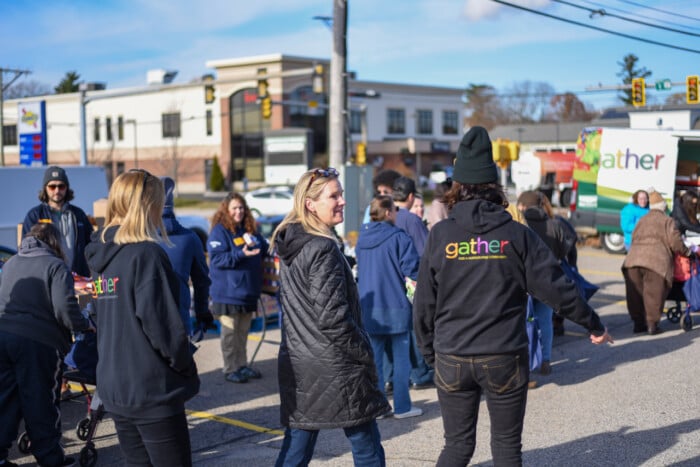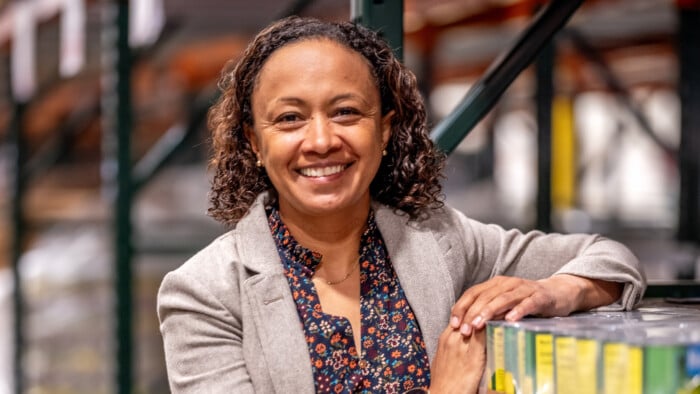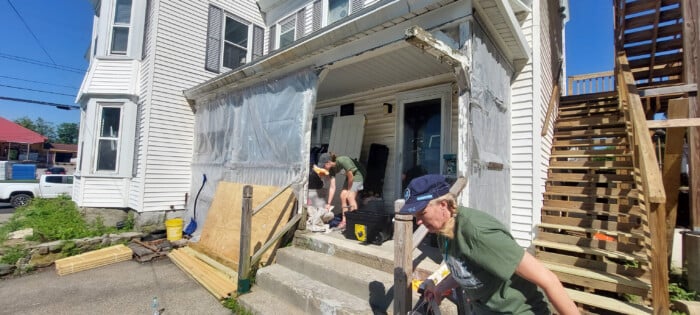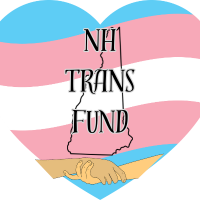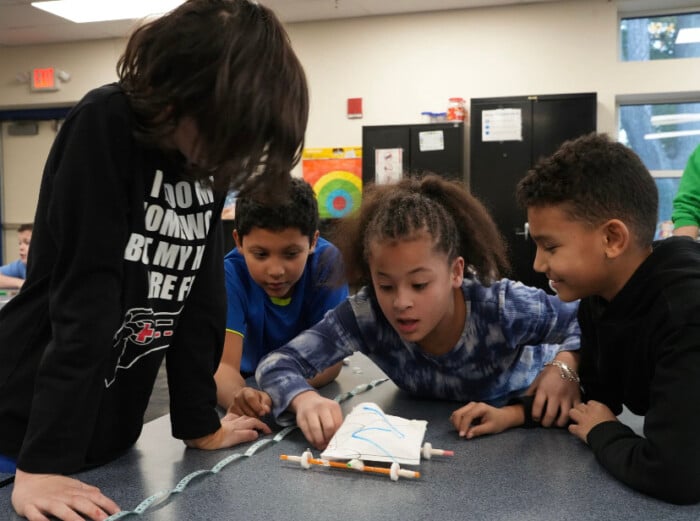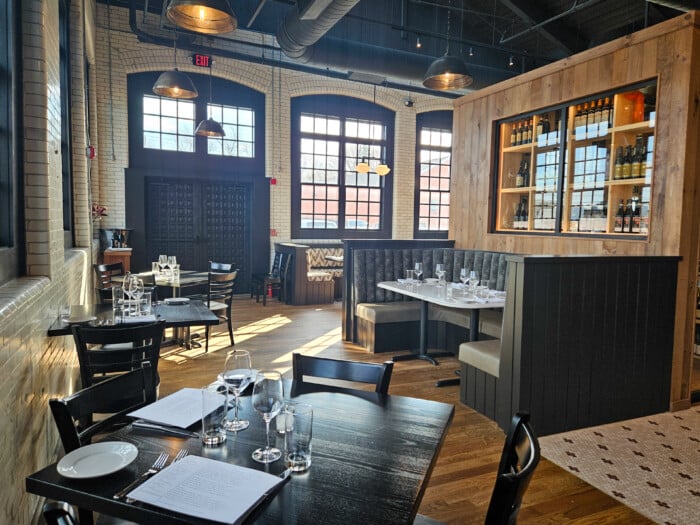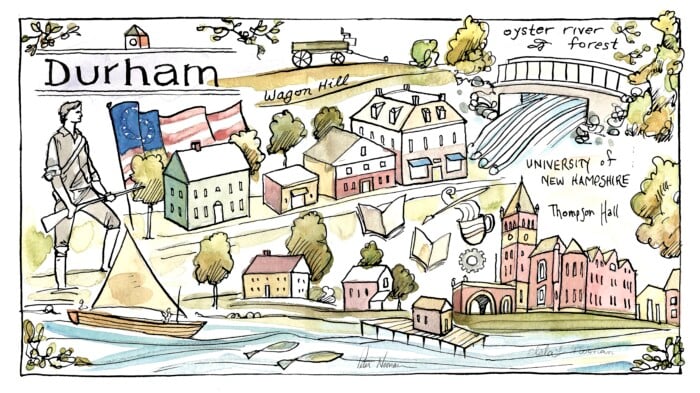Feeding the Hungry with executive director of the New Hampshire Food Bank, Elsy Cipriani
As executive director of the New Hampshire Food Bank, Elsy Cipriani works to ensure the pantry is never bare
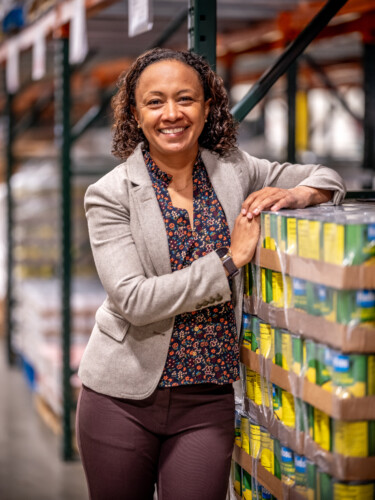
Elsy Cipriani took over in March 2024 as executive director of the New Hampshire Food Bank, a program of Catholic Charities New Hampshire that provides food for thousands of families in the Granite State.
Elsy Cipriani, the executive director of the New Hampshire Food Bank, has dedicated her life to ending poverty. From aiding farm workers in northern California fighting issues related to labor, health and education, to managing emergency shelters and combating homelessness in Boston, her work has impacted individuals from coast to coast.
And for many of those individuals, Cipriani noted, food insecurity has been a constant. That’s why, this past March, she jumped at the opportunity to lead the charge at the NHFB, the state’s only food bank, serving hundreds of thousands of NH residents who are food insecure.
New Hampshire Magazine: Can you talk to me about the food bank operations from food acquisition to distribution?
Elsy Cipriani: A big part of our operations has to do with rescuing food. That’s one of the main goals of food banks: To make sure that we are able to rescue food that is still in really good condition, and make that available to the partner agencies. We don’t do a lot of direct service.
Right now, we have more than 420 partner agencies that distribute food for us. Last year, we distributed 17 million pounds of food, but we only touched 1 million of that total. Sixteen million pounds were distributed by our partner agencies — food pantries, soup kitchens, emergency shelters, residential programs and after-school programs.
I’m mentioning this because a lot of the food that we distribute we never touch. We are talking about food that has an expiration date, so the faster we get the food out to the agencies, the better. Sixty percent of our agencies come here to pick up the food, and 40 percent we get to them. We try to get food to people as fast as we can, but very often this is a short-term solution. We can give people a bag of groceries, but we want to make sure that that individual and that family has something in the short-term and in the long-term.
We work really hard doing SNAP (Supplemental Nutrition Assistance Program) outreach and application assistance. We have nutrition cooking classes, we have the summer meal programs that we run during the summer, and we do SNAP incentives.
NHM: Can you talk to me about the current state of food insecurity in New Hampshire? Who are the most affected, and where are you seeing the most need?
EC: I will define it as an uncertainty right now because it has been a chain of different events that happened, not just in New Hampshire, but in the U.S., particularly affecting low-income populations and farmers. One of the main programs that we run is NH Feeding NH, and it’s one of those programs that allows us to buy nutritious food from local farmers. The funding that we get through this program, we use it to buy produce, protein and dairy from local farmers, and that is food available to low-income communities across the state.
This is unique because there are not that many programs that allow us to, while supporting the local communities, provide nutritious food to the people that we serve. It’s a very popular program, but we got a significant cut in the beginning of this year. It was almost a million dollars for the next three years. That’s money that farmers and our partner agencies are not going to get.
We are trying to fill the gap, and locally, we have had some private foundations and individual donors that have called and said, “We heard about this. How can we help?” These changes that are coming from the federal government, we can see the direct impact in the local economy.
Additionally, we are preparing for all the changes that are coming with the SNAP program. SNAP is one of the main tools that we have to fight poverty. We are really worried because we know that the eligibility requirements that are changing are really going to affect the population that we serve.
The federal government, in terms of SNAP and Medicaid, are shifting some of these costs to the state. The state of New Hampshire already has a very limited budget, especially the Department of Health and Human Services, so we are asking them to take the bill for something that they are not going to be able to do.
NHM: Do you think that in the last few years, especially in a post-pandemic world, that you’ve seen more people suffering from food insecurity in the state?
EC: Because there were so many incentives that were provided to low-income communities during (COVID), we are seeing that it is going up again. Food insecurity increased from last year to this year. For example, last year, one in every 10 individuals in New Hampshire was facing food insecurity. This year, one in every nine.
There is a caveat for that because we relied on data from Feeding America’s “Map the Meal Gap,” and even though I say “this year,” it’s based on two years ago. That means from 2022 to 2023 it increased, and we know that that’s going to continue increasing. From our direct service, if we compare the first half of 2024 to the first half of this year, we saw our distribution increase 12 percent already. So, we are seeing that the food that our partners need from us, the need, is getting bigger.
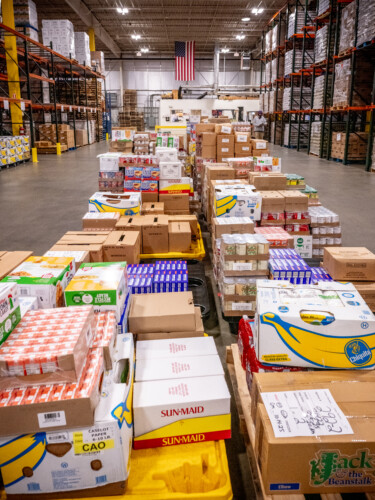
The New Hampshire Food Bank, at 700 East Industrial Park in Manchester, distributed 17 million pounds of food last year, primarly through partner food pantries, soup kitchens and after-school programs.
NHM: What misconceptions do people have about who experiences food insecurity?
EC: A lot of people face food insecurity. Food is a flexible expense, right? We must pay rent. We must pay our mortgage. We must pay our utilities. But you play around with food. You don’t tell your family, you don’t tell your children, just the quality of food that you may be getting is not as good as before. It’s really hard to put a face or to label who is food insecure in this country, because it can happen to anyone, and it’s really hard to fight it because people don’t like to disclose it.
NHM: I know we’re coming up on the holidays, so can you talk to me about anything special that you do or how the distribution efforts increase this time of year?
EC: We provide turkeys (and) hams for our partner agencies, but at the same time, we are trying to balance that. In the past, we put a lot of funding in that, and one of the things that we realized is that our partner agencies need more, so we are trying to customize, asking what they need. They want gift cards that they can give to the people that they serve.
I think that having a better connection and better communication with our partner agencies about what the needs are in their communities is probably better than just giving a turkey, because we assume that people eat turkey. But many of the agencies that we serve, they serve people like immigrants and people that may not have the means to celebrate Thanksgiving.
NHM: What aspect of this work do you find most rewarding?
EC: I think the collaboration. When I learned about this opportunity, this job, I was sold. But coming into this role and realizing how much we relied on collaboration — maybe because of the way that I grew up and being an immigrant, that you come to a country where you don’t know the language and you have to rely on other people, you have to get it right — I think that’s the part that I enjoy the most, is being able to be part of so many communities and have contact with so many community groups, food pantries, soup kitchens that have that partnership.
NHM: What can everyday New Hampshire residents do to support the New Hampshire Food Bank?
EC: Talk about food insecurity. I think that finding more information about who is doing it in their communities, because we are so well connected in every county, we know for sure that any individual, any family that goes out, they are going to be able to see who is doing it in their community and get involved.
One of the things that most of the food pantries are struggling with is volunteers. People are aging in New Hampshire. They don’t have the capacity because their volunteers are retiring, and they need more volunteers. They need more support.
For more information about the New Hampshire Food Bank, visit nhfoodbank.org.
